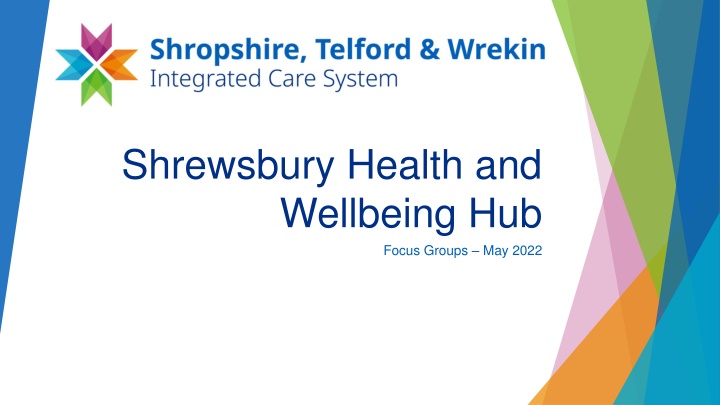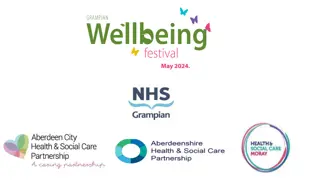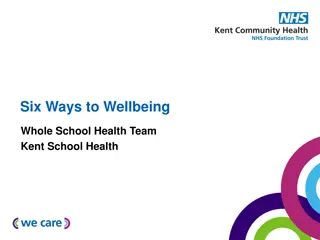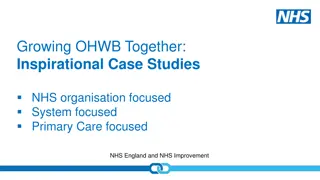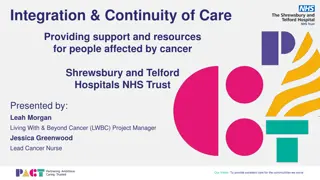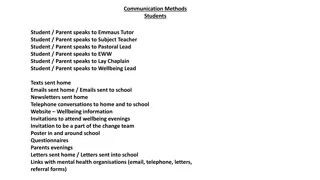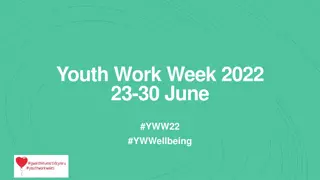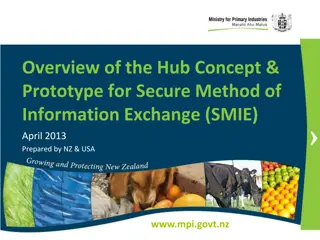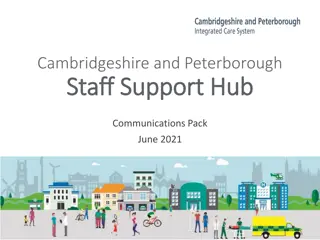Shrewsbury Health and Wellbeing Hub Focus Groups May 2022 Presentation
Explore the aims of the Shrewsbury Health and Wellbeing Hub, discuss general practice in Shrewsbury, understand the changes in healthcare, and learn about the integrated care system in Shropshire, Telford, and Wrekin. Discover the goals of the program, including improving safety, integrating community services, tackling health inequalities, economic regeneration, and promoting workforce stability.
Download Presentation

Please find below an Image/Link to download the presentation.
The content on the website is provided AS IS for your information and personal use only. It may not be sold, licensed, or shared on other websites without obtaining consent from the author.If you encounter any issues during the download, it is possible that the publisher has removed the file from their server.
You are allowed to download the files provided on this website for personal or commercial use, subject to the condition that they are used lawfully. All files are the property of their respective owners.
The content on the website is provided AS IS for your information and personal use only. It may not be sold, licensed, or shared on other websites without obtaining consent from the author.
E N D
Presentation Transcript
Shrewsbury Health and Wellbeing Hub Focus Groups May 2022
Housekeeping Feel free to ask questions or make comments in the chat function at any time. If you are Please turn microphones and cameras off during the presentation. We will answer questions in the chat after the presentation, and invite others. experiencing technical problems, please type the issues into the chat function.
Aims of today To present the programme aims for general practice in Shrewsbury To discuss GP practices in Shrewsbury and hear your views on using their services To explain how general practice is changing and why it needs to change To discuss the proposed new Health and Wellbeing Hub and understand your views on this.
Introduction to our ICS Shropshire, Telford and Wrekin Integrated Care System (ICS) is a partnership of health and care organisations working together to deliver better, more joined-up services for local people From July 2022, Shropshire, Telford and Wrekin ICS will become statutory We have ambitious plans to improve outcomes, care for local people and reduce pressures on services for the county The proposed Shrewsbury Health and Wellbeing Hub matches the aims of the ICS, plus we will own the new building.
Programme aims Improving safety and quality: Making sure our services are clinically safe and tackling the backlog of elective procedures Integrating services within the community: Developing local health and care hubs to improve the physical and mental health of people, better manage hospital admissions, and establish new models of care to best serve our communities Tackling ill-health, health inequalities and access to health care Economic regeneration: Contribute to innovation, productivity and good quality work opportunities to create economic prospects that will help improve the health and wellbeing of our population Workforce stability: Making our health and care system a great place to work.
Timeline so far Progress so far 2021 2022 Early 2021 23 Aug 26 Sept May (today) Winter 2021/22: Case for Change developed informed by listening exercise Communications and Engagement Working Group was established with representation from key partners. Second phase of engagement focus groups to discuss the Case for Change. First phase of engagement listening exercise including online survey and telephone interviews. Recommendations from the group have fed into the Engagement Plan. Sept Oct Patient and Public Advisory Group (PPAG) was established and met to review the feedback gathered.
GP practices in this area Presenter: Emma Pyrah
The changing face of general practice General practice is the first contact in the healthcare system GP patient lists are growing: An average of 2,461 in 1948; but closer to 9,000 today Life expectancy is increasing: Long-term conditions are prevalent like diabetes and obesity Treatment has progressed: From single physical appointments to a greater focus on mental health, preventative care and managing long-term conditions The buildings used for GP practices: Typically converted from houses and cannot be extended or modernised to meet future demand or accommodate other services 50% are owned by GPs, 35% by private landlords, and 15% are owned by one of the two NHS property companies These buildings cost the NHS approximately 940 million a year and are therefore not the best use of taxpayers money.
The GP practices involved in this programme The Beeches Medical Practice, Belvidere Medical Practice, Claremont Bank Surgery, Marden Medical Practice, Marysville Medical Practice and South Hermitage Surgery have said they want to relocate fully to the hub Radbrook Green and Mytton Oak surgeries will offer extended services Most of the practice buildings are no longer fit to deliver modern healthcare services and/or do not have enough space to meet future demand Running costs (e.g. rent and maintenance charges) for buildings ran by private landlords have also made some buildings unaffordable We want to allow for more flexibility of the workforce to deliver continuity of care and improved access for patients particularly those with complex health needs We want to ensure general practice in Shrewsbury is fit for the future and the best it can be for our patients.
Why we need to change and the benefits of change Presenter: Dr Charlotte Hart
The need for change Financial and operational pressure: We must plan with the resources that we know we have access to, to meet the needs of our patients. If action is not taken now, more difficult challenges will be faced in the future and some practices will become unsustainable Rising demand: With the increasing pressures, targets for planned care are not being met and the number of available beds in the NHS continues to fall. The strains on capacity will only get worse Recruitment and retention: We must retain our hard-working, dedicated clinical and support staff. We need to offer attractive conditions so we can recruit in the future Need to collaborate: ICSs are a new opportunity to work together to deliver better health and care services Need to take decisive action now: NHS performance is significantly challenged, and isn t likely to change in the near future.
Benefits to patients More quality services in one location, with modern facilities: Some services will be able to move out of hospitals and into communities, improving access and efficiency New technologies, research, learning, and new ways of working: Joined-up services will improve professional relationships and provide more opportunities for shared learning Supporting patients: Access to all parts of care under one roof GPs can focus on delivering care instead of running the buildings: Modernisation of the estate will ensure assets and value are retained as well as a sustainable future Reduced health inequalities and improved clinical outcomes: Rather than just treating illness, the hub would support the health and wellbeing of residents Quicker access to appointments: A more resilient and diverse workforce means more people available to support you when you have a medical need.
Discussion one | your experiences and views What are your experiences of general practice? (likes and concerns) What do you think about these aims and benefits? (likes and concerns) What ideas do you have to respond to these challenges?
The future for the six GP practices: The Shrewsbury Health and Wellbeing Hub Presenter: Dr Charlotte Hart
The Shrewsbury Health and Wellbeing Hub (1) Shropshire was chosen as one of six pilot areas in England marking substantial and much-needed national investment The hub would involve the co-location of practices alongside other health, social care and voluntary and community services Enabling individual practices to work in a building with other services on site will help to improve levels of access across these services, help to promote proactive and coordinated care across services, enable multidisciplinary working and innovative approaches A building owned by the NHS will be more cost effective for practices as they won t have to pay high rent and maintenance charges to private landlords.
The Shrewsbury Health and Wellbeing Hub (2) Services will be matched to the needs of local people Additional facilities will increase the number of services provided in the community It is a priority to retain our clinical and support staff - to offer attractive conditions, a solution that works best for our current workforce, is sustainable and future-proof A state-of-the-art building will provide high-quality, modern healthcare facilities which meet changing needs Similar models of care have worked well improving quality of care, increasing number of appointments, reducing unnecessary referrals, and providing better continuity of care.
Vision and guiding principles (1) Our vision for what could change with the development of a new health and wellbeing hub: Additional facilities will increase the number of services provided in local community settings, in line with the NHS Long Term Plan (2019) The state-of-the-art building will enable us to provide high-quality, modern healthcare facilities which are flexible and future- proof to meet changing needs 6 Additional facilities and services could include: 1 More appointments 6x The new hub would bring the six local GP practices together alongside other health, social care, voluntary and community services Healthcare professionals working together [more multidisciplinary working] Improved access to care 5 2 Mental health and other services on site Better diagnostics on site 4 3
Vision and guiding principles (2) Our vision for what would stay the same with the development of a new health and wellbeing hub: The practices will remain as six separate practices all retaining their own identity and independence Your GP practice will still be in charge of your records and know your history Your GP will stay the same
Potential services in the new hub Contraception and sexual health Dermatology Podiatry Community nursing Pharmacy Diabetes management Tissue viability Minor operations Midwifery COPD management Outpatients Audiology Physiotherapy Counselling services Rheumatology Diagnostics, Assessment and Access to Rehabilitation and Treatment Shropshire Orthopaedic Outreach Service Ophthalmology and retinal screening Community dental
Community-based services Paediatric outpatient services Maternity hub Musculo- skeletal Mobile diagnostic vehicle Pulmonary rehabilitation Cardiology
Discussion two | your thoughts on the plans What other services would you like to see in the hub? (e.g outpatient services, preventative services, services to support people entering and leaving hospital, or community based services.) What are your views on the plans? (likes and concerns) Is there anything else we should consider? (both positive and negative impacts)
Options appraisal process Presenter: Stephen Williams
Options appraisal process The programme team (NHS clinicians and technical experts) develop a set of essential criteria to evaluate a long list of possible scenarios During the listening exercise in autumn 2021, the feedback was used to help develop a long list of possible scenarios The long list is then evaluated by the programme team using the essential criteria This produces a medium list of possible scenarios, which must be evaluated using the desirable criteria The desirable criteria have been developed using the feedback from the autumn 2021 listening exercise. Before the desirable criteria is used to evaluate the possible scenarios, we require your views on these A reference group with representation from public, patients and wider stakeholders is being developed. The group will help weight the desirable criteria and score the possible scenarios.
Shrewsbury Health and Wellbeing Hub Listening Exercise
Process to go from long list of scenarios to short list of options Programme Team apply essential criteria to develop medium list Essential criteria defined by Programme Team Programme Team develop long list Programme Team develop detailed short list analysis to develop preferred option(s) Reference group apply desirable criteria to medium list to develop short list Desirable criteria and weightings defined by public and patients
Essential and desirable criteria 2nd step: desirable criteria 1st step: essential criteria Finance: A separate process, applied later in the development of scenarios. Accessibility Quality of care Meets local needs Improving access and patient choice Deliverability Workforce Affordability (high level) All scenarios presented to NHS England must be financially viable. The reference group will weight the desirable criteria and then score the medium list using the desirable criteria Applied by the programme team
Essential criteria and their domains Improving access and patient choice Criteria Deliverability Affordability Workforce Can the scenario meet demand now and in the future? Do we have the workforce to deliver this option? Does the scenario protect against reduced patient choice and access? Is the scenario affordable and does it deliver value for money? Domains Is there a clear, clinical evidence base? Does the scenario support recruitment and retention? Is the scenario supported by stakeholders?
Desirable criteria and their domains Criteria Range and quality of care Accessibility Meeting local needs GP practice is close to my home / work / place of study (598) High quality of care (709) Easy to book an appointment (719) Friendly staff (217) Face-to-face appointments available (615) GP practice is easy for me to get to (i.e. good transport links) (436) Clinical expertise available (for my health condition) (174) Short waiting time for an appointment (581) Domains GP practice has good parking (313) Health and care services at the GP practice site so that I don t have to go to the hospital (172) Service features (25) Convenient opening hours (244) (xx) Frequency domain was selected during listening exercise survey. Digital (telephone / video) options for appointments (93) Other health and care services nearby or at my GP practice (27) Easy access into the GP practice (e.g. wheelchair access) (32)
Discussion three | the options appraisal process Do you understand the scenario development and evaluation process? Do you understand the desirable criteria and their domains? Is there anything else we need to include or change?
Next steps Presenter: Dr Charlotte Hart
Next steps A new reference group will be established tohelp us determine the weighting for each of the desirable criteria agreed within these focus groups After the development of the possible scenarios, they will be evaluated by the desirable criteria the scoring will be undertaken by the reference group Our Equality Impact Assessment (EQIA) will be further developed as part of an Integrated Impact Assessment (IIA) to confirm the location, travel times and other details of the services proposed A report of findings will be produced following this phase of engagement and feedback will be compiled. This will then feed into the work of the Programme Team to shape plans and will be published on the CCG/ICS website A public consultation will be held in due course and is likely to run for 8 to 12 weeks between October and December 2022 (approximately).
Thank you for attending You are now free to leave the meeting
